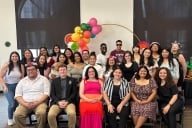You have /5 articles left.
Sign up for a free account or log in.
A political science professor conducting research in Bolivia said she had to leave the country for her safety after local media outlets ran articles falsely claiming she was a U.S. agent and was organizing protests.
Fieldwork has gotten more challenging and less safe in many parts of the world -- in particular many parts of the Middle East -- but Calla Hummel, an assistant professor of political science at the University of Miami, said she never expected something like this to happen in Bolivia. She has traveled to Bolivia most years since 2006 and has been doing research there since 2009.
Hummel was spending a sabbatical in the Bolivian city of La Paz finishing research for her book on where and how informal workers interact with the state. She had timed her trip to Bolivia to coincide with the Oct. 20 presidential election. The incumbent president, Evo Morales, declared his fourth consecutive victory in the election, but opponents alleged that the results were marred by fraud, leading to the breakout of what the Associated Press describes as the biggest protests Bolivia has seen in decades. (Morales resigned Sunday.)
Hummel’s apartment was right in the center of the action. She started posting on Facebook and Twitter about her observations of the protests.
“As a political scientist who’s interested in popular mobilization, I was taking pictures of the protests and filming them and posting on Facebook and Twitter, just what I’m seeing.”
For example: “Here’s a video of people setting fires in the street, or here’s a video of the police launching tear gas in the crowd.”
“It was very intentionally observations about what was happening and not my personal political views about what was going on in Bolivia,” Hummel said, “because at the end of the day I’m not Bolivian. I’m not a Bolivian voter. I have opinions, but that’s not the first thing that I want to put out.”
On Oct. 29 Hummel learned of a piece published in a Bolivian digital news source, Primera Línea, titled (translated from the Spanish) “U.S. Agent Who Participated in Brazilian Coup Operates in Bolivia.”
The article, citing no evidence, linked Hummel to demonstrations against the impeached former president of Brazil, Dilma Rousseff (Hummel has also lived and conducted research in Brazil). The article alleged she was now organizing protests in Bolivia, citing a Facebook post of Hummel's in which she described a protest in a La Paz neighborhood.
Hummel said she had not organized any protests in either Bolivia or Brazil, for many reasons. In the Facebook post cited in the article, she said she was describing witnessing a specific a type of protest -- the cacerolazo, in which protesters make noise by banging on pots and pans -- for the first time.
“I’m not a spy or agent in any way, shape or form," she said.
Hummel learned of the Primera Línea article via social media. "I was a little bit shaken up by this, because it was being circulated on Facebook. There weren’t a lot of threatening comments, but there were a number of threatening comments," she said.
She emailed contacts at the University of Miami, and a dean recommended she leave Bolivia. Heeding the advice, she returned to Miami. The U.S. embassy in La Paz also advised that she leave, though she did not receive the message until after she was safely home.
The news source that published the account, Primera Línea, did not respond to an emailed request from Inside Higher Ed for comment. Cambio, a state-controlled publication that also published the allegations, issued a retraction -- albeit a weak one -- in which it quoted a letter from Hummel stating that she is not a U.S. agent. The retraction notice also printed Hummel's university address.
Linda Farthing, an independent scholar and journalist in Bolivia who was named as an associate of Hummel in the Primera Línea article, said the article frightened Hummel, which is understandable. “I don’t think Calla was under any kind of immediate threat, but it is a very tense situation and it’s a very polarized situation,” said Farthing, who remains in Bolivia.
“We have asked collectively to have that story removed,” Farthing said. “What can I say? It comes with the territory and is, I think, seriously exaggerated by the accessibility that we all have now on social media. It’s very easy to attack people on social media in whatever form without ever really having to prove or explain or say anything about who they are and why you’re making this claim that this person is whatever that you’re claiming. That’s always true -- I’m sure that was true in a village in the 18th century that somebody whispered in somebody’s ear that somebody was doing whatever -- but we’re so able to reach around the world and do that now, and the person doing it can hide in ways you couldn’t in a small village.”
Asked to comment on the situation, a University of Miami spokeswoman said, “The safety of our faculty, students and staff is of paramount concern to the university.”
On Twitter, Hummel said she was relieved to have followed the instructions of her institutional review board to protect her sources. “I am thankful I was following IRB confidentiality and security protocols. No one I directly work with was named. I did not have pictures with people I work with that these outlets could use and interview data had layers of protection,” she wrote.
“This is not something that just happened to me,” Hummel stressed in an interview. “I’ve heard a lot of stories of this happening to researchers in other parts of the world. A number of people commented on these posts saying something similar happened to them. While it may be something that’s relatively rare in Bolivia or may not take this exact form, it’s something that a lot of researchers deal with.”






